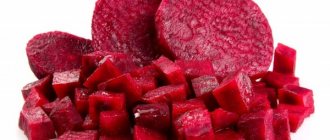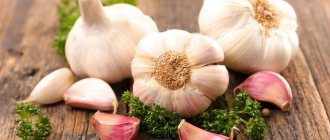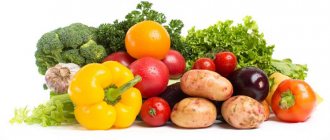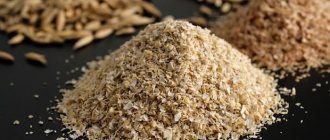Red beets are not a simple vegetable and are somewhat controversial. For, on the one hand, it is believed that this root vegetable has the power to heal a person even from the most terrible and merciless diseases in the world, and on the other hand, scientific research does not find anything supernatural in beets. Which gives reason to consider beets to be the most ordinary vegetable, not possessing even half of the healing properties that various healers and traditional healers attribute to it.
It is clear that the truth most likely lies somewhere in the middle. Therefore, we will have to experience the beneficial properties of red beets on our own health (if life forces us, of course). Or, if you’re lucky, you can see how beets help heal and restore the health of our close friends, relatives, neighbors and everyone who is ready to share their personal experience of treating this root vegetable.
A little history and interesting facts about beets
If we turn to history, we will find that in the Middle Ages, the Eastern Slavs sincerely believed: beets can protect the human body even from the plague! This belief was explained very simply - the plague epidemic never managed to “swallow” the peoples of Eastern Europe (who passionately loved beets), although in Western Europe the plague raged in full.
As we said above, modern researchers have not yet found in beets the miraculous properties that our ancestors endowed them with, but it is reliably known that this root vegetable contains substances that can effectively fight cancer cells. True, the vast majority of vegetables and fruits have anti-cancer properties, so beets cannot stand out with this fact.
The most interesting fact, in our opinion, is that beet tops on average contain twice as many useful substances as the root vegetable. Moreover, this applies not only to chard (leaf), but also to the most common table beet, which we use to prepare borscht, herring under a fur coat and other “red” dishes.
Hence the conclusion: fresh beet leaves should not be thrown away, but eaten as a salad, or in some other way...
By the way, this is exactly what people did in ancient times. At first, only wild plants were eaten, but a little later - around the second millennium BC - Swiss chard began to be cultivated. Well, for the sake of root crops, beets began to be grown only in the 4th century BC. (on the islands of the Mediterranean Sea).
Beet root crops came to Russian lands around the 10th century AD. In Western Europe, beets appeared three centuries later. Three centuries later, beets began to be divided into fodder and table beets, and in the 18th century, sugar beets were also separated.
Nowadays, beets are eaten everywhere, both by people and pets. And about a third of all sugar in the world is now produced from sugar beets.
Vitamins
Fat-soluble vitamins in beets include A, beta-carotene, E and K. Water-soluble vitamins include vitamins C, B1, B2, B3 (PP), B4, B5, B6 and B9.
Vitamins, content Share of the daily norm g 100 per
| Vitamin A | 2.0 mcg | 0,2% |
| Beta carotene | 20.0 mcg | 0,4% |
| Alpha carotene | 0.0 µg | 0,0% |
| Vitamin D | 0.0 µg | 0,0% |
| Vitamin D2 | n/a | 0,0% |
| Vitamin D3 | n/a | 0,0% |
| Vitamin E | 0.0 mg | 0,3% |
| Vitamin K | 0.2 mcg | 0,2% |
| Vitamin C | 4.9 mg | 5,4% |
| Vitamin B1 | 0.0 mg | 2,6% |
| Vitamin B2 | 0.0 mg | 3,1% |
| Vitamin B3 | 0.3 mg | 2,1% |
| Vitamin B4 | 6.0 mg | 1,2% |
| Vitamin B5 | 0.2 mg | 3,1% |
| Vitamin B6 | 0.1 mg | 5,2% |
| Vitamin B9 | 109.0 mcg | 27,3% |
| Vitamin B12 | 0.0 µg | 0,0% |
| Fat soluble Water soluble |
Chemical composition of beets
The chemical composition of beets greatly depends on the fertility of the soil in which they grew. Which cannot but affect the results of research on this root vegetable published in the scientific community...
So, for example, some scientists claim that the chemical composition of red beets contains practically no microelements, but there is quite a lot of folic acid, while others say that beets are full of chromium, molybdenum, vanadium and other micronutrients, but there is practically no folic acid.
Moreover, the amount of macroelements (calcium, potassium, phosphorus, sodium, magnesium), as well as B vitamins, is almost identical in all studies.
| Magnitude | Quantity per 100 grams |
| Beet calories | 42 kcal |
| Fats | 0.1 gram |
| Squirrels | 1.5 grams |
| Water | 86 grams |
| Alimentary fiber | 2.5 grams |
| Organic acids | 0.1 gram |
| Mono- and disaccharides | 8.7 grams |
| Vitamins | A, B1, B2, B5, B6, B9, C, E, PP, Beta-carotene |
| Minerals | Potassium (288 mg.), Calcium (22 mg.), Magnesium (46 mg.), Sodium (46 mg.), Phosphorus (43 mg.), Iron (1.4 mg.). |
Where does this leave us? To one of two:
1) you can choose the results of the study you like most and be guided by them in life
2) or take into account the similarities and completely ignore controversial indicators, and also observe your feelings when eating beets
You can also turn to traditional medicine, but this option is somewhat out of line with the “scientific” approach to evaluating beets. Therefore, we will not recommend it. Although, perhaps this is what will help you in the end...
Beets: proteins, fats, carbohydrates
BJU of beets cannot but please everyone who cares about being slim. After all, 100 grams of raw beets contain 9 grams of carbohydrates, 0.1 grams of fat and 1 gram of proteins.
Do not be afraid of the predominance of carbohydrates in fresh red beets - these are complex carbohydrates that take a long time to be absorbed by the body and provide satiety for a long time. Their moderate consumption does not harm the body and figure. Learn more about simple and complex carbohydrates.
Calorie content of beets (boiled and raw)
Separately, I would like to talk about the calorie content of beets. Because there are some features that everyone who monitors their weight and blood sugar levels should know...
Let's start with the fact that boiled beets stimulate the appetite, but raw ones do not. Why? Yes, because the glycemic index of beets (the ability to increase blood sugar) increases greatly during heat treatment. If we express this in numbers, we get the following picture:
- glycemic index of raw beets – about 30
- glycemic index of boiled beets – about 65
- Swiss chard is completely harmless in this regard, since its glycemic index is approximately 15
As a result, some nutritionists believe that boiled beets greatly increase blood sugar levels and are therefore contraindicated for people with diabetes. However, this is not quite true. After all, the calorie content of boiled beets is only 44 kcal per 100 grams (raw - 42 kcal), and not everyone can eat more than 150-200 grams of boiled beets in one sitting.
In addition, no matter how many calories are in boiled beets, and what its glycemic index is, it should be borne in mind that in cooking, beets are almost always mixed with vegetable oil, high-protein foods or unsweetened vegetables. Therefore, any dish with red beets has a low glycemic index and practically does not affect blood sugar levels.
Dish recipes
We invite you to familiarize yourself with recipes for beet-based dishes, indicating their calorie content.
Beet salad with cheese and garlic. You need to prepare it like this:
- boil the vegetable and cut into strips;
- grate hard cheese;
- finely chop the garlic and combine everything;
- season with mayonnaise and mix well.
This salad contains 211 kcal per 100 grams.
Another well-known dish is vinaigrette. In addition to beets, it contains:
- carrot;
- potato;
- pickled cucumber;
- green pea.
Usually it is seasoned with vegetable oil , then the calorie content of the dish is 120 kcal per 100 grams. Even if you are on a diet, vinaigrette can be consumed daily.
Another famous dish with beets is herring under a fur coat, the calorie content of which is about 190 kcal per 100 grams, which is very little compared to other mayonnaise salads.
As you can see, the calorie content of the product does not significantly affect the number of calories in the dishes to which you add it, either raw or boiled. But at the same time it makes them more healthy and tasty. Naturally, it is better to use vegetable oil instead of mayonnaise as a dressing, but even mayonnaise will not deprive the dish of its properties. But eating this vegetable every day will not affect your figure.
Red beets: benefits and harm. What more?
Looking ahead a little, let's say that there are clearly more beneficial properties in red beets than harm. However, there are still some contraindications to normal consumption of beets (more on them below). Now let’s talk in more detail about the benefits and harms of beets...
The scientifically proven benefits of beets for the body are as follows:
- beets increase hemoglobin, although not with the help of iron, but with the help of substances involved in the production of hemoglobin (copper, vitamin B1)
- cleanses blood vessels from “bad” cholesterol, thereby preventing and curing atherosclerosis (with long-term regular use)
- strengthens the walls of capillaries and at the same time increases their elasticity
- dilates blood vessels, thereby lowering blood pressure (note to hypertensive patients)
- easily removes excess water from the body (relieves swelling)
- reduces the risk of prostate adenoma and rectal cancer
- has a laxative effect (increases peristalsis of the gastrointestinal tract), however, it should be borne in mind that beets help against constipation only when a person drinks a sufficient amount of liquid
- adsorbs and removes waste and toxins from the body
- regulates lipid metabolism (protects the liver from obesity)
- reduces the body’s recovery time after physical and mental stress, and also increases a person’s endurance (albeit slightly)
- stimulates brain function, thereby “pushing back” its premature aging and drying out
As you can see, the list of beneficial properties of red beets is very long. However, it should be noted that raw and boiled beets have different effects on the body.
What is the difference?
Let's figure it out. What are the benefits of raw beets?
In general, the beneficial properties of raw beets coincide with the list above. However, there is something special about it:
1) raw beets retain all vitamins
2) raw fiber has twice the “penetrating” and adsorbing power
3) low glycemic index (but we already wrote about this)
On the other hand, there is an opinion that fresh beet juice contains some harmful compounds that can harm human health. In this regard, it is even recommended to leave freshly squeezed beet juice for several hours (to give time for harmful substances to evaporate). In fact, the faster you eat raw beets (drink juice), the more vitamins will remain in them. For vitamins are destroyed not only under the influence of high temperature, but also from contact with air, light and water.
And the “harm” of freshly squeezed beet juice lies in its ability to trigger an emergency cleansing of the body (destruction of fat deposits with the inevitable release of toxins into the blood).
What are the benefits of boiled beets?
The benefits of boiled beets for the body, despite the high glycemic index, are undeniable. Moreover, in some respects, boiled beets are even healthier than raw ones. After all, during cooking, only three vitamins are mainly destroyed: C, B5 and B9 (folic acid). The remaining vitamins and minerals reach the human stomach practically intact.
On top of that, all the valuable components of beets, which are not destroyed by high temperature, become more accessible to our body (due to the partial destruction of the fiber structure).
And one more thing... boiled beets contain much less nitrates than raw ones. Because the lion's share of them is destroyed when heated or turns into a decoction.
Now you know how beets are useful and whether it is worth boiling them before eating. Let's look at the contraindications...
Nutritional value, composition and calorie content
The nutritional value of red beets is very high - the chemical composition of the root crop is rich in a variety of vitamins, minerals and other nutrients. As for the calorie content, this vegetable is low, amounting to only 41 kcal per 100 g of raw product.
So, the nutritional value of beets is as follows:
- percentage of proteins, fats and carbohydrates (BJU): 2.1/0.2/3.1, respectively;
- 2.4 g dietary fiber;
- 0.2 g organic fibers;
- 85 g liquid;
- 8.6 g disaccharides;
- 0.1 g starch;
- 1.1 g ash.
Beets have relatively low calorie content, so the vegetable can and should be included in the diet of those who are on a diet or exercise. Consumption of 100 to 200 g of beets per day provides the body with vitamins A in the amount of 1% of the daily value, 2% calcium, 12% vitamin C and as much as 7% iron.
The number of calories in boiled beets is almost slightly different from the raw root vegetable and is 48 kcal per 100 g, and the calorie content of a baked vegetable is 45 kcal. It follows from this that the calorie content of beets can vary depending not only on the cooking process, but also on the type of vegetable, as well as what part of it is used:
- Sugar beets, or, as they are also called, carrot beets, have a calorie content of 46 kcal per 100 g of product;
- beet tops contain 22 kcal;
- beet juice – 41 kcal.
Keep in mind that the numbers are based on the assumption that the vegetable was prepared without adding any spices or auxiliary ingredients.
The root vegetable contains many vitamins necessary for the body, which subsequently have a good effect on general and muscle condition, which is especially valuable for people involved in any kind of sport, be it light women's fitness or heavy men's exercise in the gym.
Beetroot (table) is a vegetable with a high content of vitamins C and B, as well as carotene (which is necessary for strong and healthy hair) and nicotinic acids. In addition, the raw product contains minerals such as:
- manganese;
- magnesium;
- phosphorus;
- potassium;
- copper;
- iron;
- sodium;
- calcium;
- sulfur.
© ma_llina — stock.adobe.com
In addition to all of the above, beets are among the leaders in the content of acids necessary for the body, in particular gamma-aminobutyric acids, which have a positive effect on metabolism and brain performance.
Note: the nutritional value of boiled beets does not differ significantly from the nutritional value of fresh vegetables, if you follow the correct technology for preparing the product. During the cooking process, the carbohydrate level increases only slightly, which makes the calorie content slightly higher.
Harm of beets and contraindications to its consumption
The usefulness of beets is questioned only in a few cases:
- for chronic diarrhea (has a laxative effect)
- for hypotension (low blood pressure)
- for urolithiasis (contains oxalic acid), despite the fact that some advise using beets to destroy kidney stones
In addition, it should be said separately about the harm of raw beets: for gastritis and ulcers in the gastrointestinal tract, this root vegetable will irritate already weakened mucous membranes (due to the abundance of coarse fiber).
We have already talked about the dangers of boiled beets - if consumed in moderation, it whets the appetite and sharply raises blood sugar levels (if consumed without oil or separately from high-protein foods and other unsweetened vegetables).
Answers to frequently asked questions
Below are the main questions regarding the use of beets.
- Is beet juice healthy? The juice contains a lot of vitamins and minerals, but lacks fiber. Drinking juice on an empty stomach or against the background of chronic diseases of the stomach and duodenum can cause irritation of the mucous membranes of the digestive tract. It is recommended to take the juice together with other types of food in order to prevent possible complications.
- Application of leaves (tops). Beet leaves contain significantly more vitamins and fiber. Typically, the tops are used to reduce body weight and normalize cholesterol levels in the blood. Tops can be added to salads and other dishes.
- Consumption of kvass. In folk medicine, beet-based kvass is used to lower blood pressure and improve digestion. There is currently no scientific data that would confirm such properties.
- Use of decoction. Beetroot broth has pronounced antibacterial properties and anti-inflammatory activity. It is usually used for infectious and inflammatory diseases of the intestines and upper respiratory tract.
Beetroot during pregnancy and breastfeeding
Can pregnant women eat beets? Yes, but provided that the woman has normal or high blood pressure. People with hypotension should eat beets with caution.
It should be understood that beets can bring tangible benefits during breastfeeding and pregnancy. And not in the distant future, but right the next day. After all, many pregnant women experience chronic constipation (especially while taking iron supplements), and beets with their coarse fiber will be very helpful here.
If the beets also grew in fertile soil, then in addition to everything else, they will provide the woman’s body with vital, but rarely remembered micronutrients (molybdenum, boron, chromium, cobalt, vanadium, etc.). The influence of these elements on the health of pregnant and lactating women is very great, because they are involved in hundreds of processes in the body.
And, of course, all these “rare” microelements enter the body of babies who feed on the “vital juices” of future and existing mothers.
How to drink beet juice correctly
The beneficial properties of beets in their raw form are quite extensive, which also applies to their juice.
Fresh affects the body as follows:
- helps fight colds, relieves runny nose and sore throat;
- normalizes blood pressure;
- improves the functioning of the heart and blood vessels;
- increases hemoglobin levels, relieves anemia;
- prevents the formation of blood clots in blood vessels;
- corrects the menstrual cycle;
- helps with urolithiasis, removes some types of stones;
- calms the nervous system and prevents the development of insomnia.
You cannot simply prepare and drink beet juice; there are certain rules for obtaining and using it.
Before drinking fresh juice, it must sit for 2 hours. If this is not done, headaches, nausea and stomach upset may occur.
It is best to consume juice in combination with other drinks. The best combinations include a mix with celery, carrots, and pumpkin.
You need to start drinking juice in a ratio of 1:10. In this case, take 1 part of the drink and 10 parts of additional components. Gradually the ratio can be changed. In the end it can be 1:1.
It is not recommended to drink beet juice right away. It is best to drink a glass of the drink gradually throughout the day. And at each dose - just a few sips.
When can you give beets to a child?
There is constant debate about the age at which children can be given beets. Young mothers have doubts, caring grandmothers easily give advice (based on their own experience and understanding), and children... children treat red beets differently: some love them, others don’t even want to look at beets. In general, everything is as usual. Therefore, let's turn on logic, a scientific approach and knowledge about the chemical composition of beets and sort this out once and for all.
So, when to introduce beets into complementary foods? Ideally, after six months of age. Until this time, only breast milk or high-quality formulas. Can a one-year-old child eat beets? Naturally! But on one condition: the child should not be allergic to beets (start with a few grams of beets). Well, of course, you shouldn’t push beets into a child by force. No matter how useful you may find it.
Benefits of boiled beets
It is generally believed that any fresh vegetable has greater benefits than when cooked. However, with beets, the answer is not so obvious.
In terms of the amount of vitamins, boiled vegetables are inferior to fresh ones. Beetroot contains acids that have an irritating effect on the walls of the stomach.
During heat treatment, they are destroyed. The same thing happens with a small part of vitamins. At the same time, the main beneficial substances: betaine, fiber, pectin are retained in beets, even after a long cooking process.
The energy value of boiled beets is 49 kcal, which is not much more than that of fresh beets.
Therefore, we can say that boiled vegetables have a great positive effect. In this form it is much safer and more useful. It is boiled beets that help normalize the functioning of the digestive system: eliminate constipation. It can also relieve stress and normalize protein metabolism.
Losing weight with beets. Is it possible to?
While some still doubt whether it is possible to eat raw beets, the most motivated women are already trying out all sorts of beet diets. And for good reason. After all, the benefits of beets for weight loss are enormous!
Red beets contain a large number of substances that literally destroy fat in the human body, namely:
- betaine
- fiber
Thanks to these components, losing weight with beets is quick and painless, because betaine greatly accelerates metabolism (thus provoking the conversion of fat cells into energy), and fiber removes all excess from the intestines.
At the same time, boiled beets for weight loss are almost as effective as raw ones. The main thing is not to mix beets with mayonnaise, fatty fish (meat) and excessive amounts of vegetable oils. Because these products nullify almost all of the “weight-loss” effect of beets. Naturally, beet salad is not tasty to eat without any oil. However, be careful...
Micro- and macroelements in Beetroot, raw
Raw beets contain the following elements: Mono- and disaccharides, SFA - Saturated fatty acids, Ash, Water, Dietary fiber, Sodium, Potassium, Phosphorus, Magnesium, Calcium, Copper, Manganese, Selenium, Zinc, Iron.
Micro- and macroelementValue
| Mono- and disaccharides, g. | 6,76 |
| SFA – Saturated fatty acids, g. | 0,027 |
| Zola, Mr. | 1,08 |
| Water, city | 87,58 |
| Dietary fiber, g. | 2,8 |
| Sodium, mg | 78 |
| Potassium, mg | 325 |
| Phosphorus, mg | 40 |
| Magnesium, mg | 23 |
| Calcium, mg | 16 |
| Copper, µg | 75 |
| Manganese, mg | 0,329 |
| Selenium, mcg | 0,7 |
| Zinc, mg | 0,35 |
| Iron, mg | 0,8 |
Beet cooking time
Average cooking time for beets until tender in different containers:
- In a saucepan – 60-120 minutes
- In a double boiler – 30-90 minutes
- Microwave – 10-30 minutes
- In a slow cooker – 30-90 minutes
- In a pressure cooker – 10-30 minutes
You should also understand that the cooking time for beets directly depends on the size and age of the root crop, as well as on your preferences for the softness of the product. Particularly large or old root vegetables may take longer to cook than the specified time frame.
Methods for preparing beets
The traditional method of heat treatment of beets is boiling in water. This process is so simple that even a novice cook can handle it. However, preparing boiled beets has its own nuances:
- Wash the beets thoroughly, remove any adhering dirt or soil with a kitchen sponge or a hard rag;
- boil vegetables in their skins and with the tails remaining after cutting the tops;
- Place the root vegetables in a saucepan and add water so that it is 2-3 cm higher than the vegetables;
- after boiling, reduce heat and add 1 tbsp. l. freshly squeezed lemon juice;
- cook for 35-50 minutes depending on the type and size of the beet;
- readiness to check with a fork;
- If the beets are ready and a fork fits freely into the pulp, drain the hot water and pour cold water over the vegetables;
- leave in this form for 10 minutes, then drain the liquid, dry the vegetables and begin peeling them.
It’s even easier to bake beets in the oven: just wash them, wrap them in food foil, place them in an oven heated to 180°C and bake for 30-45 minutes. After this method of cooking, you do not need to clean the pan, as you have to do after each boiling of vegetables.
Boiled beets go well with other products:
- soft cheeses;
- veal;
- fish;
- walnuts;
- prunes;
- raisins;
- fresh or baked apples;
- green salad and any greens;
- celery;
- seaweed;
- canned peas, beans and corn;
- garlic;
- olive oil;
- mayonnaise;
- sour cream;
- balsamic vinegar;
- vegetables - potatoes and carrots.
There are a lot of recipes with beets, so the listed products in various combinations allow you to prepare many delicious salads, appetizers and first courses.
Beet storage
How long do boiled beets last? In the refrigerator, the shelf life of boiled beets is usually at least 72 hours (and generally up to a week). At room temperature, it will begin to deteriorate within 24 hours.
How to store beets in the refrigerator? In a vegetable drawer without tops, beets can easily be stored for several weeks.
Is it possible to freeze beets? It definitely makes sense to freeze boiled beets. After all, if now you have time to cook, but next time you may not have it, then why not use the “services” of the freezer? But it is better to store raw beets in the cellar for long-term storage.
How to preserve beets in winter? The ideal option is to store beets in the cellar (in sand or sawdust). The optimal storage temperature for beets is 1-4 °C. Relative humidity of the surrounding air is not lower than 90%. At the same time, there should be minimal ventilation in the basement.
The main beneficial properties of beets for the body
Beets and beet juice have many health benefits, especially for heart health and overall fitness.
Beets lower blood pressure
Hypertension is a condition characterized by excessively high blood pressure, which is dangerous due to potential damage to the heart and blood vessels. Persistent symptoms of high blood pressure can become a serious risk factor for the development of cardiovascular diseases and death from them. This risk can be reduced by eating a nutritious diet that includes foods that contain large amounts of inorganic nitrates. This will help establish optimal blood pressure levels and increase the formation of nitric oxide in the body.
Studies have shown that beets or beet juice can reduce blood pressure by up to 10 mm per hour within a few hours (, ).
Scientists attribute this beneficial property of beets to the body by increasing levels of nitric oxide, a molecule that causes blood vessels to relax and dilate ().
Beets are good for people with hypertension, as they can lower blood pressure, which will reduce the risk of heart disease and a number of other diseases.
Increasing the effectiveness of sports activities
Repeated studies have shown that nitrates have an effect on the body during physical activity. They can increase physical performance, especially during high-intensity strength and endurance exercise.
Nitrates have been found to reduce the amount of oxygen consumed by cells during exercise. Nitrates affect mitochondria - cellular particles responsible for energy production (). Beets (or beet juice) are often used for this purpose due to their high inorganic nitrate content.
Consumption of beets can improve the results of aerobic exercise: running and cycling, increase the body's endurance level, improve the use of oxygen by cells and lead to increased efficiency in sports in general ().
Eating beets can optimize the use of oxygen by the body's cells, which will increase endurance and lead to increased performance in physical exercise.
Mineral composition
The ratio of mineral substances (macro- and microelements) contained in beets is presented in the table using diagrams.
Minerals, content Share of the daily norm g 100 per
| Calcium | 16.0 mg | 1,6% |
| Iron | 0.8 mg | 8,0% |
| Magnesium | 23.0 mg | 5,8% |
| Phosphorus | 40.0 mg | 5,7% |
| Potassium | 325.0 mg | 6,9% |
| Sodium | 78.0 mg | 6,0% |
| Zinc | 0.4 mg | 3,2% |
| Copper | 0.1 mg | 8,3% |
| Manganese | 0.3 mg | 14,3% |
| Selenium | 0.7 mcg | 1,3% |
| Fluorine | n/a | 0,0% |
Beetroot for weight loss
The use of beets for weight loss is associated not only with the low calorie content of beets, but also with such properties as normalization of metabolism, improved digestion, the ability to remove toxins and waste from the body, and a diuretic and laxative effect. The low calorie content of beets and the presence of beatins makes it an excellent side dish for any meat, as well as a tasty dietary dish on its own. A cup of grated boiled beets perfectly satisfies the feeling of hunger.
You can not only cook beets for weight loss. Consumption of raw beets is allowed. A very tasty dish - stewed beets with vegetables. Beets can be added to soups, salads, and pies are made with beet tops. You can also drink beetroot juice - this is a very healthy dietary drink. The simplest beet dish for weight loss is beet salads. This is a salad with cheese, garlic and sour cream or a sweet salad with apples, dried fruits, nuts, seasoned with apple cider vinegar. And, of course, borscht. We are, of course, accustomed to the fact that borscht is a very rich, fatty soup. But if you use lean beef for borscht, and do not fry the vegetables in oil, but simmer them in water, you will end up with a very tasty and healthy low-calorie borscht.
Beets are not only prepared for serving, but also salted and pickled for the winter. Winter salads made from beets and cabbage are very tasty and healthy.
Contraindications and side effects
Beets have a number of contraindications. It is prohibited to eat raw or heat-treated vegetables if you have the following pathologies:
- acute stage of gastritis;
- increased stomach acidity;
- urolithiasis disease;
- osteoporosis;
- tendency to diarrhea and stomach upsets.
You should not get carried away with beets if you have diabetes, since the root vegetable contains a certain amount of organic sugars: the daily serving of vegetables should be no more than 70 g raw and 140 g boiled.
Like any other product, beet will be useful only within reasonable limits. Abuse of raw or boiled vegetables can cause diarrhea and exacerbation of the chronic diseases listed above.
Don't be alarmed if you see red urine when you urinate. The reason for this coloring is anthocyanins - special pigments of organic origin contained in beet pulp. If your overall health is normal, then there is no reason to worry: anthocyanins are quickly eliminated from the body and urine returns to its previous color. But when the pink tint of urine lasts for several days after drinking beet juice or eating beetroot, there is a good reason to see a doctor.











